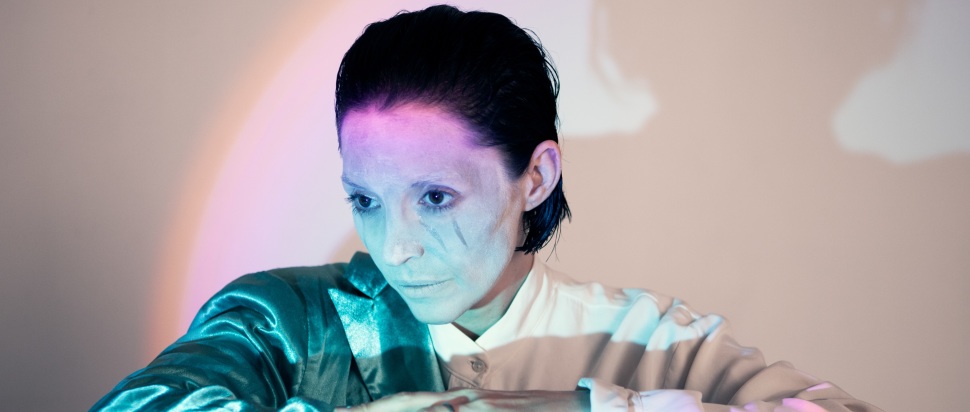Confronting Demons: Gazelle Twin on her latest album
Exploring how childhood traumas can manifest in adulthood on her latest album Black Dog, we catch up with Elizabeth Bernholz, aka Gazelle Twin
“I'm really scared of them!” laughs Elizabeth Bernholz, aka Gazelle Twin, when asked where her fascination with ghosts comes from. “It's a fucking terrifying concept to me; that there could be this whole other side of existence that is less about nature, and more about sadness and suffering.”
Bernholz is speaking to us about the inspiration behind her new record, Black Dog, an album that unfolds like a classic haunted house movie. “I'm a child of the 1980s,” she tells us. “I grew up watching horror films like Poltergeist and really wanted to evoke the sweet melodies of those movies to help me cut through some of the album’s darker moments.” Bernholz’s obsession with ghosts won’t come as a surprise to fans of her work. Her sound has always been dark and destabilising, and often explores the hidden dangers lurking in contemporary Britain; something perhaps best observed on her 2019 album Pastoral, a folk-horror exploration of the xenophobia and misanthropy in rural England following the Brexit referendum. However, her latest is a far more personal affair, and explores how childhood traumas can manifest in adulthood.
“It's probably the rawest thing I've ever made,” she confesses. “As I was finishing the album, I started to realise that a lot of what I was writing wasn’t about ghosts, but my own mental state.” Throughout her career, Bernholz has relied on elaborate costumes to keep her identity separate from the music she makes. From the blue hoodie and featureless mask she wore for 2014’s Unflesh, to the nightmarish jester from Pastoral (a demon, dressed head-to-toe in red Adidas apparel), she has adopted a new persona for each of her records, until now. “I'm not wearing anything that covers my face this time,” she informs us. “There's no relevant look that works for this album. Instead, I decided to adopt the role of a medium and let these different voices take over me. I’ve no idea how they're gonna make me behave on stage.”
I Disappear opens the record with a melody composed by Bernholz’s eldest son when he was three years old. “The album is as much about my parental guilt towards this particular child, as it is about ghosts,” she tells us. “He was in my studio playing these random chords and he just started singing the words 'I disappeared'. I instantly knew I was going to use it!”
She continues: “I suffered with this really intense postnatal depression after my first child. It felt like I was possessed; as though somebody had stepped into my body and was making me say all these horrible things.” The experience of living simultaneously on the inside and outside of your body is very particular to the experience of motherhood, something Bernholz explores across Black Dog. “I wanted the opening of the album to feel resolute. During that time I was full of all this anger that I'd never experienced before. I was lucky that I had my work to pour those feelings into, but I've met so many women that have had similar experiences and never talked about it. It's endemic of a society in which mothers are often left alone.”
Black Dog might be Bernholz's most personal album to date, but that hasn’t stopped her from using her experience to speak about wider societal issues. Tracks like Fear Keeps Us Alive and Unstoppable Force, with their raw, barbed sound, give a real sense of the contingency and danger of occupying a female body. “One of the catalysts behind this record was a recurring dream I have,” confides Bernholz as we exchange ghost stories. “I'm in this giant house, and I can feel this dark presence hiding inside one of the rooms… waiting for me.
“Then eventually it happens! Time stops and I suddenly feel myself being levitated by this unknown male entity.” Depictions of women as victims of male violence are a common horror trope, in part because of the inherent misogyny of the film industry, but mainly because statistically women are frequently victims of male violence, something Bernholz was keen to explore. “I was very young when I first became aware of the threat men pose, but as I got older, this dream started to become more and more violent. I wanted to depict that relentless sense of anxiety that many women have. It's really horrible to suddenly realise that you've spent your whole life living in fear.”
The record closes with A Door Opens, an eerie nocturnal ballad whose bare bones arrangement is rich with supernatural imagery, but Bernholz insists it's an optimistic finale. “A lot of this album is me trying to confront the demons of the past, but I wanted to show that there's hope for anybody who feels trapped between these two states of being. I wanted to show that there is a way through all of this. That there is a light!”
Black Dog is released on 27 Oct via Invada Records
